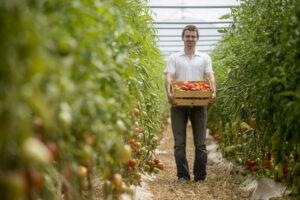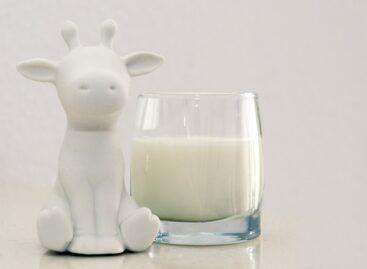Five good tips to support sustainable agriculture
Representatives and supporters of the organic movement celebrate the Day of Organic Farming with events and educational campaigns across Europe. In Hungary, the Ecological Agricultural Research Institute (ÖMKi) once again calls the attention of buyers to the advantages of organic production and consumption. According to international data, on average 30% more species live in organic farms, the quality of the soil and its water retention capacity are better. Although farmers need a lot of knowledge and experience to produce organic products, one kilogram of organic food is produced with an average of 15% less energy than their fellow farmers who use chemical inputs.

(Photo: ÖMKi)
Two years ago, the European Commission declared September 23 as the European Day of Organic Farming, in order to create a tradition with the significant date and to draw attention to this sustainable form of farming, as well as a way of life. The holiday announced at the time of the autumnal equinox refers not only to the balance between night and day, but also to the spirit of ecological cultivation that strives to be in harmony with nature. The European cooperation related to the European Organic Day provides an opportunity to popularize organic farming, an ideal opportunity to celebrate the organic sector on a wide scale, together with producers and customers. At the same time, it is appropriate for the profession to review the results achieved so far and the future goals, and to inform those interested more widely about the benefits of organic farming and healthy organic foods.
More than chemical-free
Organic farming, also known as organic farming, is a sustainable food production system that favors local resources and natural processes over external additives and foreign substances. It is the most dynamically developing form of agriculture in the world, which combines tradition, scientific research and innovation. The detailed requirements of organic farming are – in a unique way among farming systems – prescribed by European Union and domestic legislation. The eco or bio labeling of products is certified by state-accredited inspection organizations all over the world, including in our country. “In organic farming, the use of synthetic chemical plant protection agents, herbicides and fertilizers is prohibited, but at the same time, organic is much more than chemical-free. It represents a systems-level approach where, in addition to quality food production and a fair living for farmers, the goal is also to maintain well-functioning ecosystems. For food security, the preservation of soil health and biological diversity is just as important as the practices that guarantee adequate crop yields.” – said Dr. Dóra Drexler, executive director of ÖMKi, who since 2020 has also held the position of vice president of IFOAM Organics Europe (European Association of Organic Farmers). “Currently, organic farming provides the best guarantee for sustainable food production. With its control system and good practices from the farm to the table, it offers effective and low-risk methods for local, healthy food production even in the face of increasingly extreme weather conditions affecting agriculture.” he added.
As in nature, so in agriculture, biodiversity and healthy soil ensure adaptability
We especially need this in our changing climate. According to international data, due to the conscious use of land and the protection of natural habitats, on average 30% more species and 50% more living organisms occur in organic farms. Nitrate leaching is 28-39% less, so our natural waters are more protected from pollution in addition to ecological management. The soil quality and fertility are proven to be better, on average 26% less soil loss due to erosion and 137% higher water penetration rate, which indicates a more favorable soil structure and higher water retention capacity. Since organic farming aims at as closed a nutrient cycle as possible, – without the use of fossil-based, synthetic plant protection agents and fertilizers -, the production of one kilogram of organic product requires 15% less energy consumption than usual.
Build a sustainable future – support bio!
Organic farming protects the health of crops, people and the environment in a controlled manner, with fair and careful methods. It is in the interest of all of us that, thinking about the problems of our time and the future generation, we really support sustainability with our everyday actions. Anyone can become an organic farmer who applies the ecological production methods specified in the legislation and complies with the applicable production rules, and in the case of goods production, he carries out his activities within the framework of the control system. However, not everyone needs to buy land and a tractor to contribute to sustainable agriculture. Anyone can decide to move towards sustainability with small, thoughtful steps in their life, and vote for a healthy and conscious lifestyle with their everyday choices.
How can you support organic farming on a daily basis? Here are five simple tips
- Buy directly from the producer!
By buying from a producer’s organic market or as a member of an ecological box system (see community-supported agriculture), you save significantly more, since you buy directly from the farmer.
- Vote with your money!
If you have the opportunity, choose domestic and buy as many organic products as possible! In this way, you reduce the environmental burden and support Hungarian eco-farmers, since they can only survive if they buy their healthy products. When buying an organic product, look for the official logo, the label with white leaves on a green background!
- Everything in its own time!
It is not only much more sustainable and delicious to eat seasonal organic vegetables and fruits, but also more economical. If possible, buy a larger quantity at once, which you can save for later (by drying, canning, etc.).
- Produce for your own pleasure!
If you can, get involved in organic gardening, we’ll help! By following the approach and good practices of organic farming, you can not only produce healthy food for yourself and your family, but you can also create ecological oases where creatures displaced from their habitats due to intensive land use can find refuge.
- Educate yourself and your environment!
Find out about organic farming by visiting events, reading articles, watching videos, listening to podcasts, and watching shows, and pass on the knowledge you’ve acquired to others! Take advantage of the power inherent in social media and boldly pledge in your posts that you too support the bio! If you can afford it, bring a little more organic perspective into your life this month, and remember: every seemingly small action adds up, every small decision counts!
Join the celebration in person!
ÖMKi also makes the celebration of organic farming memorable with the Researchers’ Night. By visiting six stations, you can learn about the institute’s research topics and results during entertaining puzzles and exciting presentations. On the evening of September 29, from six o’clock in the evening, the researchers of the horticulture, arable land, animal husbandry and agroinformatics teams are waiting for all ages with exciting programs at the center of the research institute in Óbuda.
Related news
The guarantee of support for farmers is the preservation of an independent, autonomous agricultural policy
🎧 Hallgasd a cikket: Lejátszás Szünet Folytatás Leállítás Nyelv: Auto…
Read more >AM: government helps dairy farmers with new measure
🎧 Hallgasd a cikket: Lejátszás Szünet Folytatás Leállítás Nyelv: Auto…
Read more >Related news
Lidl is building a new administrative and logistics centre in Straubing
🎧 Hallgasd a cikket: Lejátszás Szünet Folytatás Leállítás Nyelv: Auto…
Read more >Hygiene on new foundations
🎧 Hallgasd a cikket: Lejátszás Szünet Folytatás Leállítás Nyelv: Auto…
Read more >








